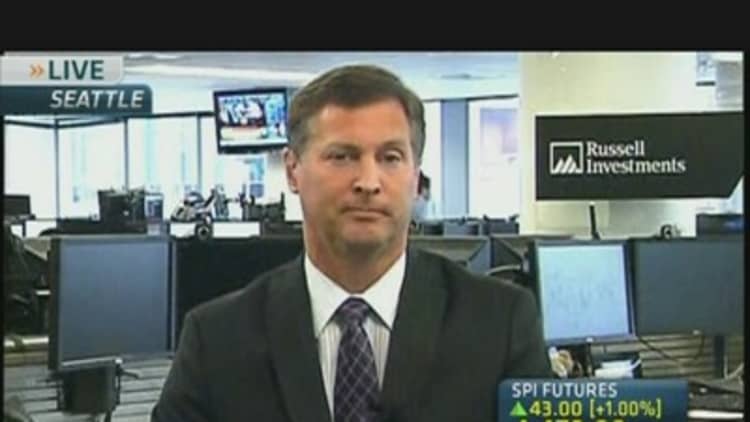The U.S. jobs market is in focus with monthly payrolls data out later Friday and the one thing that could provide a big boost to job creation - that has stayed weak in recent months - is a signal that the "fiscal cliff" will be avoided, economists told CNBC.
The "fiscal cliff" refers to the combination of tax hikes and spending cuts that are due to kick in at the start of 2013 unless Congress takes action. Most economists agree the impending fiscal tightening would result in a recession.
Concerns over this fiscal precipice have delayed investment and hiring decisions by companies, therefore any indication that the issue will be dealt with swiftly should bode well for the jobs market, said experts.
Mike Dueker, chief economist at Russell investments, said there is reason to be optimistic, with financial markets no longer as concerned about the impending fiscal tightening as they were a few months ago.
"The most important thing about the employment outlook is that when you look at the financial market warning signs about concerns over the "fiscal cliff," these signs have got better over the past month – corporate bond spreads have narrowed, the LIBOR-Fed (Federal Reserve) Funds rate spreads have narrowed," Dueker told CNBC Asia's "Squawk Box."
"If we get some positive resolution to the 'fiscal cliff' with some reasonable compromise, we could see some strong economic growth going into 2013 and we could get some (payrolls) numbers in the region of up to 200,000 next year," he added.

Economists expect the U.S. economy added a tepid 125,000 new jobs in October, while the unemployment rate rose to 7.9 percent from 7.8 percent, according to a poll by Reuters.
[Read More: October Jobs in Focus, but November Could Be Key]
Jobs Worries
Nearly six million jobs through 2014 could be lost if Congress does not take action to stop the impact of the "fiscal cliff," a loss that would send the unemployment rate higher than 11 percent, according to a report last month by the U.S. National Association of Manufacturers.
"There is a view that concern about the "fiscal cliff" could delay hiring decisions. Nobody expects any progress until after the election, so it will get interesting after next week and we could start to see some progress," said Richard Jerram, chief economist at Bank of Singapore, referring to the presidential election that takes place on November 6.
[Read More: What About an Election 'Cliff'? Here's What Could Happen]
Weak employment growth has been a major concern for U.S. policymakers and the Federal Reserve, which unveiled an aggressive quantitative easing program in September, and has said it would continue its asset-purchase plan until the labor market improved significantly.
The Fed should buy bonds at least until the jobless rate falls below 7.25 percent, Boston Fed President Eric Rosengren said on Thursday. Separately, Atlanta Fed President Dennis Lockhart said the U.S. central bank would like to see broad improvement in the jobs market before scaling back quantitative easing.
Analysts said for the U.S. economy to really pick up steam and make a notable dent in the unemployment rate, new jobs in excess of 200,000 need to be created each month.
"We need to see a number with a two in front of it, 200,000 – then the market would be convinced that a recovery is underway," Jonathan Barratt, founder of Barratt's Bulletin, a commodities market newsletter, told CNBC.
Jerram said he expected stronger employment growth next year as the housing market improves. Data last week showed new home sales in September jumped to their highest level since April 2010.
"The recovery in the housing market is important, it is a job creation sector and this has been underestimated," he said. "As long as we can dodge the "fiscal cliff" in the next month, we should see stronger housing and employment data."
- By CNBC's Dhara Ranasinghe; Follow her on Twitter: @Dhara CNBC
* Correction: An earlier version of this story referred to the fiscal cliff as tax cuts and spending hikes. This version corrects to state the fiscal cliff as tax hikes and spending cuts.


